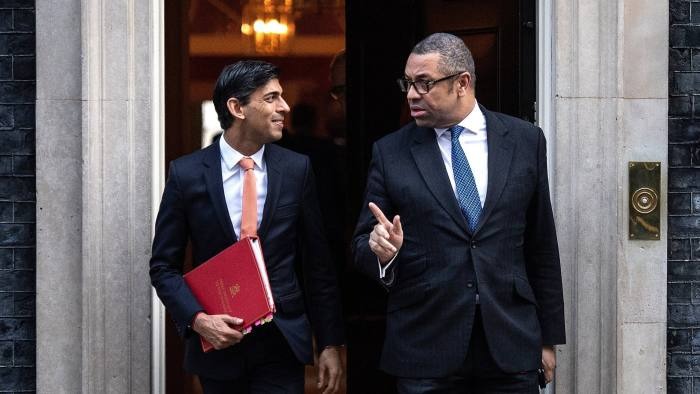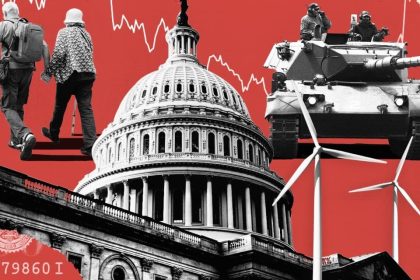Also in this newsletter, Britain’s botched hosting of two Soviet dignitaries in 1956
Good morning. The China spy story continues to reverberate around Westminster. The latest twist comes via Lucy Fisher and George Parker, who have dug up an embarrassing scoop for the government. Some thoughts on the political consequences for Rishi Sunak (and some hopefully fun historical trivia, too).
Faulty lines
Rishi Sunak and other key ministers knew of the arrest of a parliamentary researcher accused of spying for China but still pressed ahead with increasing engagement with Beijing, Lucy Fisher and George Parker have revealed.
Government insiders told the Financial Times that Sunak and UK foreign secretary James Cleverly were told of the Metropolitan Police’s actions close to the time of the arrest in March.
In policy terms, it is a much less bad story than the alternative, which is that the Metropolitan Police had not informed the government’s senior figures of the arrest until it reached the newspapers.
Things like that have happened before: in April 1956, when Nikolai Bulganin, former premier of the Soviet Union, and his eventual successor Nikita Khrushchev visited the UK, the Secret Intelligence Service disregarded the then prime minister Anthony Eden’s instructions to leave the Soviet vessel, a cutting-edge cruiser, well alone. They sent in a diver by the name of Lionel “Buster” Crabb to take a look at the hull. He never returned — his headless body washed up the following summer — and the Russians complained, not unreasonably, of espionage.
Eden was, again not unreasonably, furious and it was part of why he removed John Sinclair from his post as “C”. So, you know, if you’re Sunak and you’re looking at all this, it really could have been worse.
But in political terms the scoop is about as bad as it could be. It shows Sunak’s claims to be “appalled” by reports of Chinese espionage in Westminster to be a nonsense: he clearly wasn’t that appalled. The revelation had not led him to reverse his position that China is not “a threat” but “an epoch-defining challenge”, or stopped him from sending James Cleverly to visit.
And in my view, he was right not to! But Sunak has got into a mess because he is trying to shift the UK’s China policy while avoiding having an explicit argument with his party’s increasingly powerful Sinosceptic tendency.
One of the ways that politics is ultimately an intellectual exercise is you do actually need to set out what it is you want and why, and to persuade both your party and the country to come along with you to get it. Since his resignation from Boris Johnson’s government, Sunak has tested to destruction the alternative approach, where you try to fudge and blur where you disagree with your own party, and it has not worked. It did not allow him to defeat Liz Truss among Conservative members. It has not made the Conservative party as popular as he was when he took over the leadership. Instead, it has made him almost as unpopular as the Conservative party, according to a YouGov poll:

Sunak faces many political challenges that are not of his making (for the roadblocks standing in Keir Starmer’s path to power, check out Miranda Green and Robert Shrimsley’s go at “political bingo” here).
But one issue that Sunak absolutely owns is the failure to argue for what he actually wants.
A historical note
While looking up some factual details about the death of Buster Crabb in Peter Hennessy’s excellent book Having It So Good, I realised I had forgotten just what an utter, wall-to-wall disaster Khrushchev’s 1956 visit to the UK was.
In addition to the disappearance of Crabb, the Foreign Office’s usual Russian interpreter fell ill. The replacement, Hennessy writes, “arrived the worse for drink”. Then, the description of Antony Lambton, the parliamentary private secretary, as a “shooting” Lord led Khrushchev to believe not that Lambton was prone to hunting, shooting and fishing, but that the luckless parliamentary bag carrier was soon to be shot.
Things took a turn for the worse when the translator got to work on Khrushchev’s speech. As DR Thorpe recounts in his wonderful biography of Eden:
His first translation began, “HE says he is pleased to be here, but if we are pleased to have him is another matter”. Silence fell and Selwyn Lloyd’s [the foreign secretary] expression froze. Khrushchev, unaware of anything untoward, pressed on with his speech. To the Russian leader’s comment about Britain and Russia having much in common, the interpreter added his own gloss: ‘Don’t you believe it, we haven’t got eight million prisoners in Siberia!’
More followed in like vein, before the interpreter was quietly ushered from the room.
Fortunately, when what had happened was explained to Khrushchev, he found the whole thing incredibly funny. Another dinner, with Labour’s shadow cabinet, proved much more disastrous. This contemporary report from Time magazine captures the full flavour of what happened, and is very much worth five minutes of your time, but suffice it to say that the following morning Khrushchev was heard to remark that having encountered British socialists, he preferred the Conservatives.
Now try this
As I have kvetched and moaned about quite a lot lately, I have had a cold. (The good news is I am now completely recovered and as such this will be the last time you have to read about it.) Being shut in means I have finally finished Horizon Forbidden West. In Tom Faber’s review when the game first came out, he (rightly) warned there was quite a lot to do in it, but I’ve very much enjoyed grazing on it in small bursts. Anyway, let me know what I should play next.
Don’t miss the FT subscriber-only webinar this afternoon on China’s economic slowdown and what it means. Register here for your free ticket.
Top stories today
- Blair tells Labour | Tony Blair has warned that Keir Starmer will inherit “a country that’s in a mess” if Labour wins next year’s UK general election, and that the party must accept it will not be able to tax and spend its way out of trouble.
- UK spy agencies | The European Court of Human Rights has ruled that two foreign nationals living outside the UK had their privacy violated by Britain’s spy agencies as part of a wider mass surveillance programme.
- Rayner pledges higher sick pay | A Labour government would bolster statutory sick pay and ensure that it is paid by employers from the first day off work, deputy leader Angela Rayner has announced.
- BP chief quits | Bernard Looney has resigned as chief executive of BP after admitting he had failed to disclose the extent of past personal relationships with colleagues, the company has said.
Source: Financial Times



